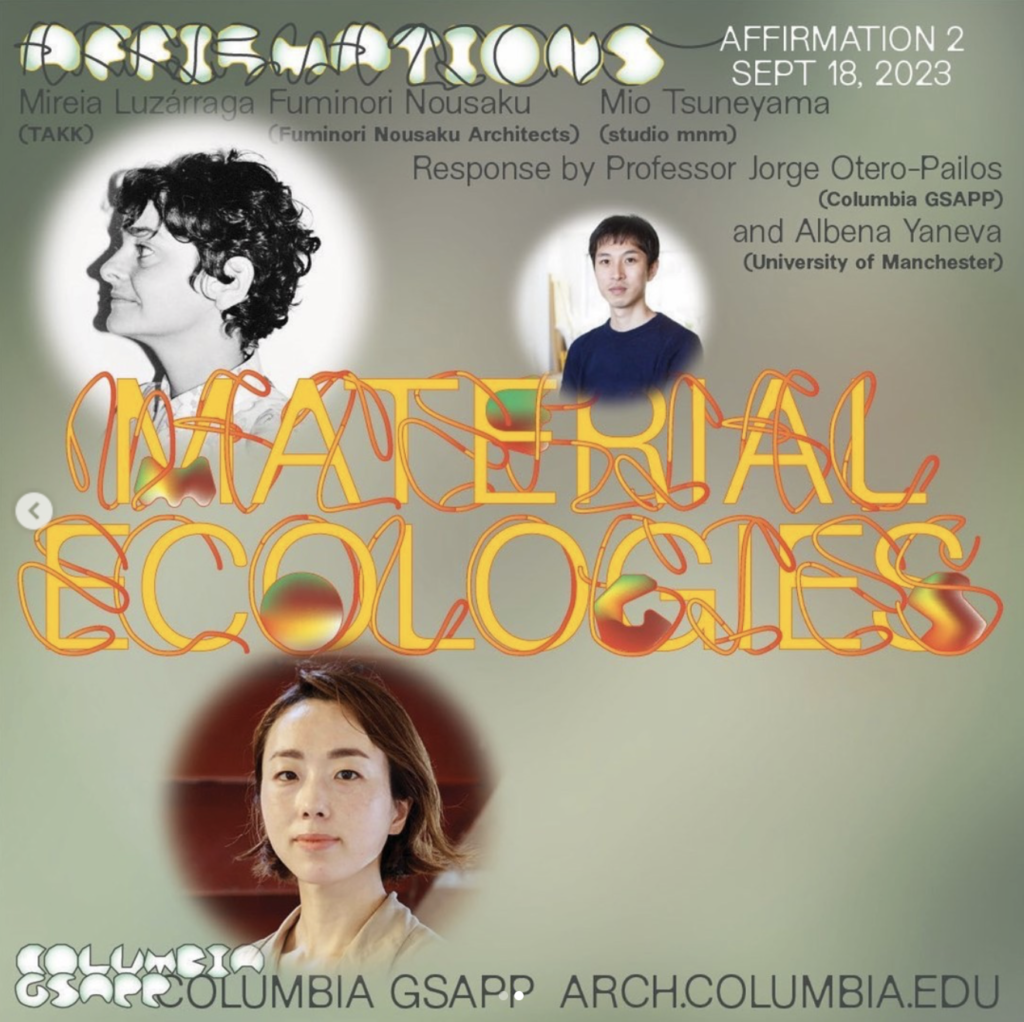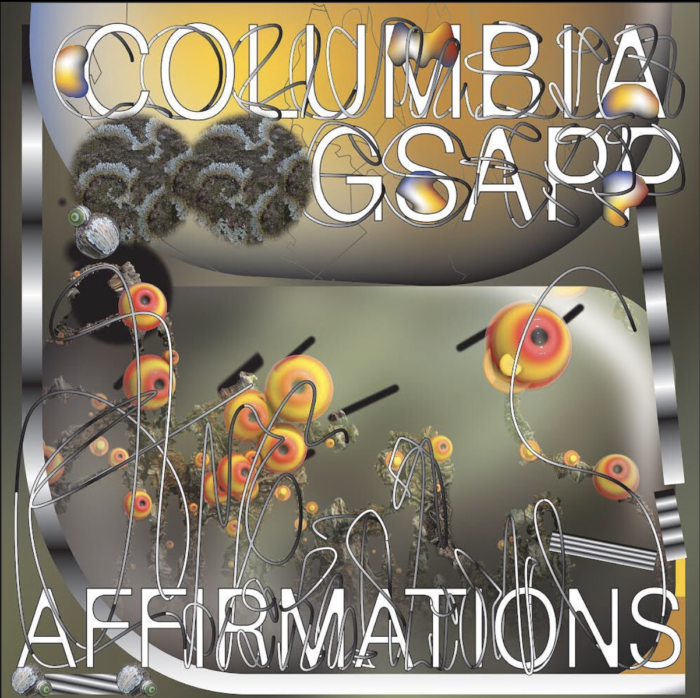MON, SEP 18 6:30PM
New York, Discussion, Affirmation

Architects Mireia Luzárraga (TAKK), Fuminori Nousaku (Fuminori Nousaku Architects), and Mio Tsuneyama (Studio mnm) participate in the second edition of the AFFIRMATIONS series under the theme of “Material Ecologies.” The discussion is followed by a response from Adjunct Professor Albena Yaneva and Professor Jorge Otero-Pailos.
This lecture will be hosted in Wood Auditorium at Columbia GSAPP and live-streamed on GSAPP’s YouTube channel. Members of the planetary AFFIRMATIONS cohort can join the webinar via this link.
AFFIRMATIONS is an eight-month series of discussions with designers, researchers, planners, preservationists, and activists to affirm and interrogate how to think and redesign the built environment at the intersection of climate, ecological, societal, bodily, and technological crises and defiance. As a project convened to interrogate and affirm how to think and practice the reworlding of societies and ecosystems now, AFFIRMATIONS is intended to align evidence and aspirations. It will summarize and state underrepresented histories and possible futures that emerge from the cracks in the structures of power built on the interdependency of carbonization, extractivism, colonization, racialization, anthropocentrism, inequality, patriarchy, and technocracy. GSAPP students and faculty, together with a cohort of respondents selected from all around the world through an Open Call, are participating in the discussion throughout the academic year. Learn more here.
SPEAKERS
Mireia Luzárraga is an architect (ETSAM) and Dean’s Visiting Assistant Professor at Columbia GSAPP. Luzárraga founded TAKK in 2010, an architecture and design studio based in Barcelona. Her projects investigate how architecture can catalyze the development of more democratic lives through the incorporation of feminist thought, ecology, and politics into its practice. Their work has received recognition such as the COAM award, the “Temps de les Arts” award, and the FAD award. Their work takes place in both the public and private spheres. TAKK’s clients include FRAC-Centre Val de Loire and IVAM (Instituto Valenciano de Arte Moderno), Barcelona City Council, FAD (Foment de les Arts i el Disseny), Vitra, Swatch, Hermès, FITUR (Feria de Turismo), or CA2M (Centro de Arte 2 de Mayo).
Mireia Luzárraga is currently a professor at the IAAC, Institute for Advanced Architecture of Catalonia, and La Salle, and together with Alejandro Muiño at Columbia GSAPP. Previously TAKK has participated as a professor and lecturer in institutions such as the University of Alicante, ETSAM, IED (Istituto Europeo di Design), ELISAVA, RMIT, Floating University Berlin, or ILEK Stuttgart.
Fuminori Nousaku is a Japanese architect based in Tokyo and is currently teaching at Tokyo Metropolitan University. Nousaku obtained his Bachelor’s degree in 2005 and his Master’s degree in 2007, both from the Tokyo Institute of Technology. He undertook an internship at Njiric + Arhitekti Zagreb, Croatia, as a part of his doctoral program in 2008. Nousaku went on to establish his architectural firm Fuminori Nousaku Architects in 2010. He received a Doctorate in Engineering in 2012 from Tokyo Institute of Technology, where he had the role of Assistant Professor of Architecture from 2012 to 2018. Afterwards, he was Associate Professor of Architecture at Tokyo Denki University 2018-2021. His works were exhibited at the Japanese Pavilion in the 15th Venice Architecture Biennale, and he collaborated with artists at the Japanese Pavilion in the 58th Venice Art Biennale.
Mio Tsuneyama is a Japanese architect and founder of Studio mnm. She began her study of architecture at Tokyo University of Science (TUS), Japan and completed at École Polytechnique Fédéral de Lausanne (EPFL) in 2008 as Swiss Government International Scholarships student, where she taught as a visiting professor in 2022-2023. She worked as an architect at HHF Architects in Basel after her study until she went back to Tokyo to start her own practice Studio mnm in 2012.
Mio has built her career in the academic field since then as she taught at TUS as Assistant Professor and Junior Associate Professor since 2013. She also teaches at several private universities in Japan and has begun to teach as a guest professor at EPFL in 2022.
Studio mnm’s most notable project is “House for Seven People” (2013), a renovation of the single family house into shared house which received a special mention as an exhibited project of Japanese Pavilion for national pavilion in the 15th International Architecture Exhibition, and “Holes in the House” (2017-), which she renovates while living there with her partner Fuminori Nosaku.
Albena Yaneva is Professor of Architectural Theory and Director of the Manchester Architecture Research Group (MARG) at the Manchester Urban Institute. She holds a DEA from Ecole des Hautes Etudes en Sciences Sociales and a PhD from Ecole Nationale Supérieure des Mines de Paris (2001). She has been Visiting Professor at Princeton School of Architecture (2013), Parsons, New School (2015) and Politecnico di Turino (2018). She held the prestigious Lise Meitner Visiting Chair in Architecture at the University of Lund, Sweden (2017-2019).
Her research is intrinsically transdisciplinary and crosses the boundaries of science studies, cognitive anthropology, architectural theory and political philosophy. She is the author of seven monographs: The Making of a Building * (Peter Lang 2009), *Made by the OMA: An Ethnography of Design (010 Publishers 2009), Mapping Controversies in Architecture (Routledge 2012), Five Ways to Make Architecture Political. An Introduction to the Politics of Design Practice(Bloomsbury 2017), Crafting History: Archiving and the Quest for Architectural Legacy (Cornell University Press 2020), Latour for Architects (Routledge 2022), Architecture After Covid (Bloomsbury 2023). She co-authored The New Architecture of Science: Learning from Graphene (World Scientific Publishing 2020) with the Nobel Laureate in Physics Sir Kostya S. Novoselov. She is also the editor of What is Cosmopolitical Design? (Routledge 2015, with Alejandro Zaera-Polo).
Jorge Otero-Pailos is a Professor and the Director of the Historic Preservation Program at Columbia GSAPP, as well as an architect, artist, and theorist specializing in experimental forms of preservation. He is the founder and editor of the journal Future Anterior, co-editor of Experimental Preservation (2016) author of Architecture’s Historical Turn (2010) as well as a contributor to scholarly journals and books including the Oxford Encyclopedia of Aesthetics and Rem Koolhaas’ Preservation Is Overtaking Us (2014). Jorge Otero-Pailos is a member of the Academy of Arts and Sciences of Puerto Rico, and has received awards from major art, architecture, and preservation organizations, including the Kress Foundation, the Graham Foundation, the Fitch Foundation, the Canadian Center for Architecture, UNESCO, and the American Institute of Architects. He studied architecture at Cornell University and earned a doctorate in architecture at M.I.T.
AFFIRMATIONS is curated by Andrés Jaque, Dean of Columbia GSAPP, and Bart-Jan Polman, Director of Exhibitions and Public Programs at Columbia GSAPP.

